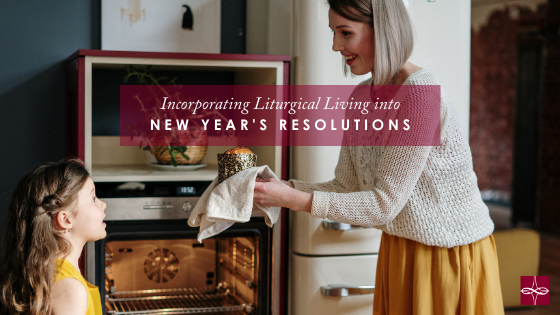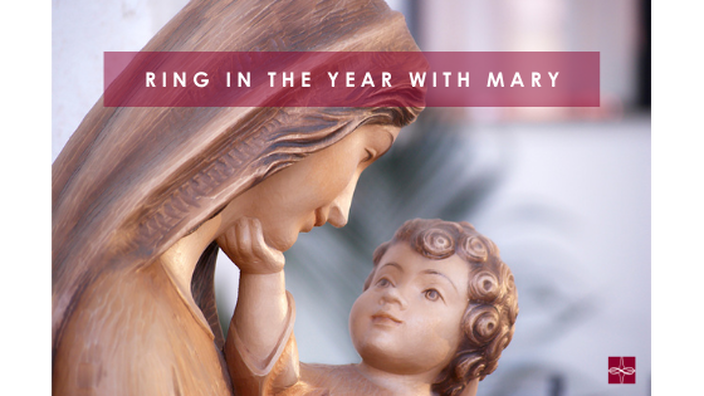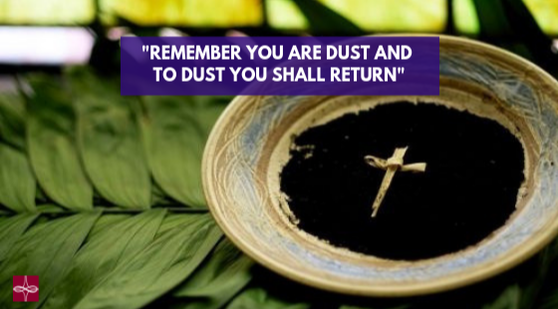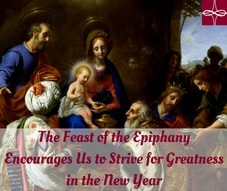|
During our marriage preparation, my husband and I made a mission, vision, and values spreadsheet for our marriage goals (nerdy, we know!). Part of our goals include living an authentic Catholic lifestyle, which we believe integrates the liturgical season into our new family unit. Some of my favorite memories from childhood include cooking and baking with my mom and having meaningful discussions with my parents about our Catholic faith. Traditions like these are important to my husband and me, and we look forward to continuing to build off of our parents’ traditions while adding our own. To build traditions within our family, we’ve started with the idea of liturgical living. Liturgical living brings the life and breadth of the Church into our own homes and can be accomplished through certain prayers, celebrations, meals, crafts, and other traditions. This can also be described as building up the domestic church – which may be even more important than ever during the Covid-19 pandemic. As newlyweds, we have slowly added liturgical season traditions into our daily lives, such as celebrating saint feast days and preparing our house for Advent and Christmas. A New Year’s resolution we’ve set for ourselves in 2021 is trying to incorporate more of the Church’s liturgical seasons into our home to better appreciate the richness of our Catholic faith. One of our favorite wedding gifts to help us implement our goal of liturgical living is The Catholic All Year Compendium by Kendra Tierney. Tierney shares how her family celebrates the Church’s liturgical season 365 days a year. She starts off the book by encouraging families to begin celebrating what makes the Catholic faith most approachable to each family member – saint namesake feast days and Baptism anniversaries. Special meals and desserts, prayer, stories, activities, and conversations are different ways to make the celebrations meaningful. After noting namesake feast days and baptisms, Tierney recommends starting slowly and gradually, adding in other feast days important to each family and doing things that already fit into existing daily routines. The free calendars given out at church for the new year have these dates with the liturgical year, such as Ordinary Time, Lent, etc. A fabulous Christmas present I also received last month is the Blessed Is She planner that incorporates feast days and the liturgical year. This is all a process that takes time and can be added upon each year or changed. It shouldn’t be meant to overwhelm. In our annual family planning meeting for 2021, my husband and I went through each month and picked which feasts we’d celebrate after our saint name days and baptisms. Our church even made our first feast day celebration easy by providing us blessed chalk and a prayer to say while marking 20 + C + M + B + 21 above our front door mantle for Epiphany on January 6! We’ve also added making “king cake” cinnamon rolls for dessert as part of the tradition. How do you plan to incorporate Catholic liturgical living into your family’s routine this year? What are some of your favorite liturgical living traditions? If you practice liturgical living already, how has this helped your family learn about the Catholic faith? For more resources on Marriage and Family, please click here.
0 Comments
January 1, Catholics celebrate the Solemnity of Mary, Mother of God, one of the holy days of obligation in the Church. This celebration is a special way to celebrate Mary’s special role in God’s plan in the Christmas story, as well as a way to start the year full of grace, ready to tackle those New Year’s resolutions. Although the practice of New Year’s resolutions is not distinctly Christian, our resolutions gain a new significance when we attend to Mary’s story. Discern Your Resolutions The story of Mary’s call to motherhood is a paradigm of Biblical discernment. When Mary received Gabriel’s announcement, “She was greatly troubled at what was said and pondered what sort of greeting this might be” (Luke 1:29). In faith, Mary wrestles with God’s calling. Even after her great “Yes,” and giving birth, “Mary kept all these things, reflecting on them in her heart” (Luke 2:19), revealing she is still learning what her vocation means and how to live it. What’s this got to do with New Year’s resolutions? Discernment is a spiritual, prayerful decision-making process between possible courses of action. What specific habits or practices is God calling you to work on this year? There are plenty of worthwhile resolutions—there’s a million things I need work on—but it’s just not all possible to accomplish in a year, or ever. Prioritize resolutions that strengthen your personal vocation. Expect Without Expectations Mary’s faith is “expectant” but without “expectations.” In other words, Mary expects God to act in her life, but doesn’t place limitations on who, what, when, and where. Mary trusts the angel Gabriel’s words, “nothing will be impossible for God” and is free to live and say, “May it be done to me according to your word” (Luke 1:37-38). Maybe God will bring about the outcomes of your resolution through unexpected ways or people. That’s the way it often works in scripture and the lives of the Saints. When you give God permission to act on his terms, you are free to boldly expect that God will do new and great things in your life this year. Make Room For Others Even free from original sin, God uses other people to accomplish his plan in Mary’s life. Mary’s story was made possible through her reliance upon truthful friends and family. Her cousin Elizabeth speaks truth and hope into her situation (Luke 1:42), and her husband Joseph goes to heroic lengths to let God’s call come to fruition. Share your resolution with someone you trust. Whether it’s a major lifestyle change or not, ask them to keep you accountable, and always with prayer. Accountability also prevents goals from becoming purely self-centered or even idols from seeking God first (e.g., just to impress people at the beach). No one can accomplish your resolution for you, but you can find people to accomplish it with you. Resolve to Live the Truth Mary shows the true path by always making everything about Jesus. “Do whatever He tells you” (John 2:5). A true personal change will always lead us to more fully reflect our true identities as sons and daughters created in the image and likeness of God. But the truth is, sometimes resolutions are born of self-loathing or lies we’ve bought instead of the desire to more fully reflect God’s truth. This often happens with body or image-related resolutions; to be thinner, smarter, stronger, etc. While these aren’t de facto bad things, the tendency becomes seeking physical solutions for a spiritual or psychological wound that really needs healing. That’s why discernment with spiritual direction and honest accountability is vital. Exercise programs or supplements say we should consult a physician first- but it’s also true when it applies to spiritual exercises for our soul! Mary and the saints save us from spiritual self-medication, which close us off from the Divine Physician. As we embark on yet another faith-filled adventure of a New Year and with it the thought of all those New Year’s resolutions, I would like to invite you to reflect with me on Jesus’ words offered to the Pharisees in the Gospel of Mark:
Likewise, no one pours new wine into old wineskins. Otherwise, the wine will burst the skins, and both the wine and the skins are ruined. Rather, new wine is poured into fresh wineskins. (Mark 2:22) Jesus, throughout the Gospels, is always inviting us to examine and “re-view” the condition of our hearts above everything else. His words above, albeit confusing at first, shed light on His Heart and His promise to us: “I have come that they might have LIFE and have it more abundantly” (John 10:10). I think we would all agree a more abundant life is what we pray and hope for at the beginning of each New Year. The rising question, however, is “how do we get there?” The answer, I believe Jesus offers us, is contained in His advice given to the Pharisees. He says the pathway to an abundant life lies within the condition of our hearts – the readiness of our “wineskins.” Our hearts like the wineskins, Jesus says, must be constantly renewed and “refreshed” ready to hold that new wine or grace He is always willing to give to us – and thus become for the world a witness of “grace at work.” You see, the Pharisees were so concerned with the do’s and don’ts on their list that their identity, as children of God, was lost in a sea of narrow-minded laws and disciplines. They gave up the opportunity for new wine and new hearts! Even though the prophet Ezekiel proclaimed that God wanted to give them New Hearts all along (c.f. Ezekiel 11:19), they didn’t want to give up their “old wineskins” (old hearts) and place the “new wine” (grace) Jesus was offering them into “fresh wineskins” (converted hearts). In fact, this is what happens to many people and their “New Years resolutions” when their hearts remain unchanged and unaffected by Grace. They sometimes end up rejecting their resolutions because they had nowhere to store the new wine that Jesus offered them. They couldn’t see beyond the “do’s and don’ts” – the “idols” they had created for themselves are powerless towards true change. We must never allow our resolutions to become idols separated from the truth and light of Grace within our hearts. For only those who are pure in heart will see what God is truly offering them (c.f. Matt 5:8). And so, in this sense, I would offer that the goals and resolutions we set every year are re-viewed according to the condition of our hearts. “Re-viewed” so that we’re careful the “new wine” (grace-filled change) Jesus offers us this New Year isn’t going to be poured into the same old “wine-skins” or wasted in a bucket of “empty promises” we often leave ourselves with. But, that our hearts are truly renewed and store within them the new wine, the new life, the new truth of who we are and meant to be. Thus, in keeping our hearts renewed, we prevent the grace-filled resolutions (“new wine”) we accept from Him for this New Year from becoming just another space to fill up on the old “to-do” list (“old wineskins”) that is quickly abandoned and lost altogether. Jesus, this New Year, is offering us an opportunity to really accept something completely new and re-energizing –a new heart ready for His grace to fill it and complete it. I’m talking about experiencing a real encounter with Jesus and a true conversion of the heart! I believe that understanding our New Year’s resolutions from this perspective will inevitably lead us to a deeper relationship with Him and most certainly place us on the road to becoming the person we’re meant to be – physically, mentally, spiritually, the best version of yourself! At last, new wine in fresh wineskins! Bart Zalvetta is a member of the Theology Department of Skutt Catholic High School in Omaha, Nebraska The arrival of New Year’s Day often brings with it resolutions, goals, and new words or phrases that help us try to shape the next 365 days before us. Things like healthy eating, stricter budgets, more time spent in prayer, and increased amounts of exercise define our drives for self-improvement. We give extra time to turn our focus inward to make ourselves stronger, smarter, holier, and healthier. In an attempt to change our lifestyles, we might separate ourselves from our previous habits, relationships, or preferences so that we can sharpen our focus even more on self-growth. We hone our discipline and increase our self-reliance in the name of improvement. In the new year, our focus is often inward. While this inward focus isn’t harmful in itself, we might find ourselves stuck in our self-reliance. Now that a few weeks into the new year have passed, many of those resolutions, goals, and mantras might have faded into the background of post-holiday life. At this point, many of us have lapsed in our new practices, or we might have abandoned our resolutions altogether. We might find ourselves isolated in the new patterns we have picked up or starting to flounder due to a lack of support. Even though our New Year’s resolutions may have been made with the best or holiest of intentions, we might find ourselves failing without others to encourage us, support us, or hold us accountable. While the new year is the time when our focus is inward, the weeks soon after, when our discipline begins to wane, give us cause to lean outward. What would it look like to lean outward in our resolutions in the weeks ahead by seeking others to help us carry them out? Why might allowing ourselves to be helped by others and accompanied by them lead us to a more meaningful and spiritually significant pursuit of our resolutions? Though as Catholics we frequently hear about accompaniment in a context of explicitly spiritual progression, its fruitfulness is still applicable in non-explicitly spiritual goals in an informal sense. As the final document from the Synod on Young People, the Faith, and Vocational Discernment reminds us, “accompaniment cannot limit itself to the path of spiritual growth and to the practices of the Christian life” (Final Synod Document, 94). Accompaniment can help us experience transformation in many areas of our lives in addition to our spiritual life, as it “fosters growth in holiness through everyday circumstances and interests” (The Art of Accompaniment, 15). Though on the surface it may look like simply reaching out for the help of a friend, seeking out accompaniment to help us carry out our New Year’s resolutions has a deep theological and spiritual significance. Accompaniment is a form of “bear[ing] one another’s burdens [in order to] fulfill the law of Christ” (Galatians 6:2). When we seek another’s help to bear our burdens, experiences, hopes, and challenges, we open ourselves up to be in communion with someone else; we profess that we were created by God out of love, to love, and to be loved by others. Accompaniment is a simple way by which we actively remember that “The LORD God said: It is not good for the man to be alone” (Genesis 2:18). When we seek the help of another, we affirm the beauty of being human: we’re not meant to live life completely on our own effort and initiative. Having a good listener, mentor, or friends helps us to turn our inward focus in our resolutions outward. We no longer remain alone in our efforts, strivings, or discipline. The support of another trusted person helps us remain steadfast in our resolution to be healthier, spend more responsibly, or love more generously. This support can take the form of a quick text from an accountability partner to check in on our progress, or a weekly meet-up with a mentor to discuss our challenges. Similarly, we can seek more formal relationships of accompaniment to help meet our goals. Beginning a relationship with a therapist might help us explore more deeply our relationship with others or just as seeking the help of a personal trainer might allow us to have the added accountability to eat more nutritiously or get physically fit. Relying on others in the pursuit of transforming ourselves reminds us of the beautiful gift of being human: as human beings, we can have a profound effect on one another in providing support, love, and encouragement in growing into the people God has destined us to be. Whether sought out in a formal or informal sense, accompaniment challenges us to let ourselves be loved by others in the simplicity and complexity of our everyday life. Allowing ourselves to be supported by others, even in something as simple as our New Year’s resolutions, reveals the deep significance of others to our vocation to holiness.
“Remember you are dust and to dust you shall return.” We are now over a week into our Lenten journey; the reality has set in. We are questioning our decisions to give up sweets or the snooze button, and we are tired. Perhaps we have even failed a few times. The forty days seem to drag, and the somberness of the liturgical season has made itself known. Yet during the Ash Wednesday service at my parish, our priest was talking about the joy of the season and how our failures are meant to bring us closer to Our Lord. In a word, he talked about the hope of Lent. As someone who would rather stay in the joy and light of the Christmas season, I was really challenged by Father’s perspective, especially now, after my many failed attempts to give up the snooze button. We often focus so much on the “giving up” aspect of Lent that the words joy and hope do not seem to go hand in hand with this season. This is especially true when I think of the phrase that kickstarts our Lenten journey: “Remember you are dust and to dust you shall return.” On a superficial level, this sign on our forehead doesn’t look so good. Where are the hope and joy in having ashes smeared on your forehead? Throughout his homily, Father also encouraged us to change our perspective on the difficult acts of penance we are attempting and instead to live in the reality that this season could be a time of true conversion of heart. Our Lord desires us to be holy! The acts of penance we choose could be the very means He uses to break us of habitual sin and to bring a deeper level of charity into our hearts. Conversion of heart and holiness? I could get behind that; I can see the joy there! The priest did not say “if you fail your resolutions” but “when you fail.” This is a reminder of our weakness and utter dependence on Jesus, who will be making His way to Calvary soon, in Scripture, to save our souls. This dependence on Him will assist in our conversion of heart, considering “we can do nothing without him” (John 15:5). So: it’s alright to fail, but run back to Him. Beg Him for more grace! Now let’s read this sentence from the Ash Wednesday service one more time: “Remember you are dust and to dust you shall return.” Where is the hope there? Father explained that this is the most hopeful reality yet. Ultimately this reminder of our sinfulness and our death paradoxically represents the life we have in Christ, the Resurrection of Jesus, and the hope we have of entering into the Eternal Reward. Even though the phrase seems bleak, it can propel our hope throughout these 40 days. We have something to strive for, to live for, and to love for. Though I have failed at my Lenten resolutions more times than I have not, I pray with the hope that my humanity might be resurrected, that Our Lord may convert my sinful ways, and that I may remember that this liturgical season is less about what I do and more about what the Lord is doing in my heart to get me home. What are ways you need to be renewed in hope and joy? How can you accept the failures that come with penance and run to Jesus this Lenten season? “Remember you are dust and to dust you shall return.” For more resources to accompany you on your Lenten journey, please click here. This is such a rich time for us as Catholic Christians! Within the past month, we’ve begun a new liturgical year, celebrated in praise and thanksgiving the Nativity of our Lord, the Holy Family, and the Blessed Virgin Mary, and we continue to celebrate as we approach the Epiphany of our Lord. It is quite difficult to wrap our hearts and minds around the richness that has been available to us over these past four weeks in the midst of the hustle and bustle of the holiday season. Among the chaos of planning and celebrating, we have also rung in a new calendar year. 2017— with its successes, failures, struggles and triumphs—has come to a close and we stand at the precipice of 2018. We all know what that means: New Year’s resolutions. Are you hoping for more control over your health, finances, or career? Perhaps you are hoping to find more time to pray and manage stress in your life. What is it that you are hoping to gain control of this year or to do more regularly? As we prepare to choose and implement changes that we would like to make in our lives, let us not forget that we are still in the midst of celebrating the Word made flesh, Emmanuel. The change and possibility of a baby, born in a humble manger, is reflected in the beginning of a new year. Is our gaze still fixed on the babe in swaddling clothes? What would 2018 bring if instead of resolving to gain control of our lives, we truly allowed the Messiah to be Emmanuel, God with us. Jesus is waiting for each and every one of us to echo the “yes” that was uttered by the Holy Family as they welcomed Him into their lives. What if instead of resolving to control everything, we resolved to say yes to that tiny baby born of a Virgin? During one of the Advent homilies at our parish, our pastor challenged us to think about times we have attempted to be the messiah of our own lives by trying to grasp or control various situations or circumstances. During this time of change and resolution, it can be tempting for us to forget that we are not the Messiah as we make plans and goals for the upcoming year. As I reflect on this, I am reminded of the words of the hymn “These Alone Are Enough” by David Schutte, based on the Suscipe prayer of St. Ignatius of Loyola: “Take my heart oh Lord. Take my hopes and dreams. Take my mind with all its plans and schemes. Give me nothing more than your love and grace. These alone, oh God, are enough for me.” It is good and just to strive to improve our character and to foster good and healthy habits in our lives. However, instead of resolving to do it on our own, by the gift of that blessed Christmas morning, we have the choice to freely give all of these things over to the One who makes all things new. As you stand at the threshold of this New Year and envision your hopes and dreams for 2018, take a moment to reflect on what these possibilities could become if you allowed them to be infused by the abundant grace of God. It is still the Christmas season. There is still time to approach the manger. Take the leap of faith. Instead of resolving to gain control, approach the manger and resolve to say YES and to be transformed! Resolve to offer the babe in swaddling clothes your mind, your heart, your body, and soul. As you boldly step out into 2018, my prayer for you echoes the words of Saint Paul, “May the God of peace make you perfectly holy and may you entirely, spirit, soul, and body, be preserved blameless for the coming of our Lord Jesus Christ. The one who calls you is faithful, and he will also accomplish it.” Question for Reflection: What are some resolutions you can hand over to the Lord this New Year? Today is the fifth day of the Octave of Christmas and for many of us, the hubbub of Christmas has come and gone and we are getting back to work. On Christmas Day, we were overwhelmed with the joy of the birth of Christ and the excitement of sharing in God’s love for the world. This feeling does not necessarily wear off right away, it can stick with us for many weeks to come and leaves us wondering “what’s next?”
Every time I hear these words I think of the show The West Wing, where President Bartlet’s signature phrase is “what’s next?”. This phrase brings continuity to the story line as the characters continually dedicate their lives to serving the nation. As I think about it now, we can use this simple little phrase to help ground us as we move beyond the Christmas season. The year 2017 is just a few days away and many of us are thinking about what our new year’s resolutions are going to be: from dieting, to posting a photo on Instagram every day, to reconnecting with old friends. While these are great ideas for the coming year, instead of just focusing on ourselves, let us also try to ask “what’s next” for our faith and our relationship with Christ. We can do this in a few simple steps:
Our relationship with Christ is critical and now is the perfect time to evaluate it. We have so many resources available to us: our priests and parishes, our friends and bible study groups, the saints and the Holy Family, and many more. Asking ourselves “what’s next,” gives us the opportunity to recommit ourselves to God, to dive deeper into our faith, and to live out our lives as apostles. Let us use the momentum of the new year and the joy of the Christmas season to motivate ourselves into keeping our faith alive and healthy. Nicholas Shields is a Young Professional in Washington, D.C. As we begin the new year of 2016, many of us design our road maps for the coming 12 months: lose weight, pray more, become more charitable, finish “xyz” project, etc. These personal goals are all about hopefulness with the anticipation of bettering ourselves. After putting together my own list of New Year’s resolutions, I thought to myself, “Isn’t this why I seek guidance from Jesus? To erase failings of the previous year and replace them with goodness?” The Feast of the Epiphany provides us with inspiration to tackle our resolutions by following the Lord’s individualized path for each of us. In Pope Francis’ Epiphany homily from 2014, he says, “[The magi] teach us not to be content with a life of mediocrity, of ‘playing it safe’, but to let ourselves be attracted always by what is good, true and beautiful…by God, who is all of this, and so much more! And they teach us not to be deceived by appearances, by what the world considers great, wise and powerful. We must not stop at that. It is necessary to guard the faith.” It’s so easy to fall into the trap of desiring what others around us may be or have, and we can mistakenly set resolutions imitating societal pressures. We are called to discern our unique purpose and skills for the betterment of society, not copy someone else’s. Perhaps my favorite portion of Pope Francis’ 2014 homily is his call to not be content with the current situation. We can always do more to improve ourselves or assist others inour immediate or global communities, whether that includes boosting our spiritual livesor revising our charitable giving plans or a call to do something else. God constantly challenges us to strive for greatness, never settling. The magi faithfully followed their journey toward Jesus, the manifestation of God. This total abandon of following the status quo so they could find Jesus is the same trust we are called to place with Him today. The magi did not fall into Herod’s trap of darkness after seeing the newborn baby Jesus. So, too, must we also guard the faith from darkness in the guise of light. The example provided by the magi encourages us to follow the greatest desires written on our hearts by God. January 1, Catholics celebrate the Solemnity of Mary, Mother of God, one of the holy days of obligation in the Church. This celebration is a special way to celebrate Mary’s special role in God’s plan in the Christmas story, as well as a way to start the year full of grace, ready to tackle those New Year’s resolutions. Although the practice of New Year’s resolutions is not distinctly Christian, our resolutions gain a new significance when we attend to Mary’s story. Discern Your Resolutions The story of Mary’s call to motherhood is a paradigm of Biblical discernment. When Mary received Gabriel’s announcement, “She was greatly troubled at what was said and pondered what sort of greeting this might be” (Luke 1:29). In faith, Mary wrestles with God’s calling. Even after her great “Yes,” and giving birth, “Mary kept all these things, reflecting on them in her heart” (Luke 2:19), revealing she is still learning what her vocation means and how to live it. What’s this got to do with New Year’s resolutions? Discernment is a spiritual, prayerful decision-making process between possible courses of action. What specific habits or practices is God calling you to work on this year? There are plenty of worthwhile resolutions—there’s a million things I need work on—but it’s just not all possible to accomplish in a year, or ever. Prioritize resolutions that strengthen your personal vocation. Expect Without Expectations Mary’s faith is “expectant” but without “expectations.” In other words, Mary expects God to act in her life, but doesn’t place limitations on who, what, when, and where. Mary trusts the angel Gabriel’s words, “nothing will be impossible for God” and is free to live and say, “May it be done to me according to your word” (Luke 1:37-38). Maybe God will bring about the outcomes of your resolution through unexpected ways or people. That’s the way it often works in scripture and the lives of the Saints. When you give God permission to act on his terms, you are free to boldly expect that God will do new and great things in your life this year. Make Room For Others Even free from original sin, God uses other people to accomplish his plan in Mary’s life. Mary’s story was made possible through her reliance upon truthful friends and family. Her cousin Elizabeth speaks truth and hope into her situation (Luke 1:42), and her husband Joseph goes to heroic lengths to let God’s call come to fruition. Share your resolution with someone you trust. Whether it’s a major lifestyle change or not, ask them to keep you accountable, and always with prayer. Accountability also prevents goals from becoming purely self-centered or even idols from seeking God first (e.g., just to impress people at the beach). No one can accomplish your resolution for you, but you can find people to accomplish it with you. Resolve to Live the Truth Mary shows the true path by always making everything about Jesus. “Do whatever He tells you” (John 2:5). A true personal change will always lead us to more fully reflect our true identities as sons and daughters created in the image and likeness of God. But the truth is, sometimes resolutions are born of self-loathing or lies we’ve bought instead of the desire to more fully reflect God’s truth. This often happens with body or image-related resolutions; to be thinner, smarter, stronger, etc. While these aren’t de facto bad things, the tendency becomes seeking physical solutions for a spiritual or psychological wound that really needs healing. That’s why discernment with spiritual direction and honest accountability is vital. Exercise programs or supplements say we should consult a physician first- but it’s also true when it applies to spiritual exercises for our soul! Mary and the saints save us from spiritual self-medication, which close us off from the Divine Physician. It is the Year of Consecrated Life, proclaimed by Pope Francis and begun on November 30, 2014. It is actually more than a year … extending until February 2, 2016! In 1997, Pope John Paul II instituted February 2nd as World Day for Consecrated Life, which is attached to the Feast of the Presentation of Jesus in the Temple.
This year is to be along the lines of the Year of the Priest a few years ago or the Year of Faith of more recent memory – a once-in-a-lifetime kind of thing, this makes it pretty exciting! In Pope Francis’ video message that was viewed at the Vigil to begin the Year of Consecrated Life, he set the stage, “My first words, on this occasion, are of gratitude to the Lord for the precious gift of consecrated life to the Church and to the world. May this Year of Consecrated Life be an occasion for all members of the People of God to thank the Lord, from whom every good comes, for the gift of consecrated life, appreciating it appropriately.” It is the Year OF Consecrated Life and FOR the whole Church. Much of the content connected with this celebratory Year is directed to Consecrated persons, but that doesn’t mean there isn’t something in it for everyone. Since it is the season when we might start thinking about making New Year’s resolutions, I thought the three “aims” of the Year of Consecrated Life might give us food for thought. Pope Francis issued a letter – his full message – for the Year, issued on November 29, 2014, the eve of the Year and directed to his “Brothers and Sisters in Consecrated Life.” (If you’re interested in reading the whole thing, you can find it here.) The first aim of the Year of Consecrated life “is to look at the past with gratitude.” (Introduction) In a couple of weeks we will start to see all of the “year in review” programs and news captions. Do we have our own manner of reviewing our year or several years? Do I tend to focus on my mistakes or bad things that happened? Pope Francis starts us off with the disposition of gratitude as we look back. He invites Consecrated persons to claim the richness of their Institute’s history, charism, and action of the Spirit which brings us to the point where we are today. This is a valuable activity because, as Pope Francis explains, “Recounting our history is essential for preserving our identity, for strengthening our unity as a family and our common sense of belonging. More than an exercise in archaeology or the cultivation of mere nostalgia, it calls for following in the footsteps of past generations in order to grasp the high ideals, and the vision and values which inspired them, beginning with the founders and foundresses and the first communities.” Advent calls us to the same kind of remembering. In the readings of last Sunday, Peter asks us “what sort of person ought you to be?” Looking at our past can help remind us of our goals, values, and ideal, and recognize how we live consistently with this vision and where we might do better. The second aim of the Year of Consecrated Life gives us some concrete follow-through from the first aim: “This Year also calls us to live the present with passion. Grateful remembrance of the past leads us, as we listen attentively to what the Holy Spirit is saying to the Church today, to implement ever more fully the essential aspects of our consecrated life.” Recalling those things most important to me, the things innate to my identity, I can claim them as my own (again or for the first time) and live out of them, anew, with passion! The challenge to Consecrated persons is no less the same for all believers. “For the various founders and foundresses, the Gospel was the absolute rule, whereas every other rule was meant merely to be an expression of the Gospel and a means of living the Gospel to the full…. The creativity of charity is boundless; it is able to find countless new ways of bringing the newness of the Gospel to every culture and every corner of society.” Does this fit into our plan for the New Year? It is a nice idea, but what does it look like? Pope Francis continues, “Living the present with passion means becoming “experts in communion,”… In a polarized society, where different cultures experience difficulty in living alongside one another, where the powerless encounter oppression, where inequality abounds, we are called to offer a concrete model of community which, by acknowledging the dignity of each person and sharing our respective gifts, makes it possible to live as brothers and sisters….So, be men and women of communion! Have the courage to be present in the midst of conflict and tension, as a credible sign of the presence of the Spirit who inspires in human hearts a passion for all to be one (cf. Jn 17:21).” As in all things Catholic, there are never two without three! The third aim should come as no surprise: to embrace the future with hope. Hope for the future makes the past both meaningful and bearable, and the passion for the present possible. This is not meant to be a wishful-thinking hope, but a leap of faith. How can I embrace that which is not yet here? Pope Francis explains, “This hope is not based on statistics or accomplishments, but on the One in whom we have put our trust (cf. 2 Tim 1:2), the One for whom “nothing is impossible” (Lk 1:37). This is the hope which does not disappoint; it is the hope which enables consecrated life to keep writing its great history well into the future. It is to that future that we must always look, conscious that the Holy Spirit spurs us on so that he can still do great things with us.” How am I writing my own history? Can I trust in the God for whom all things are possible? If I resolve to the live the present with passion, can I add that next layer of commitment to embrace the future with hope? The Year of Consecrated Life is just beginning; may the blessings and graces of this Year be enjoyed by you and all People of Good Will! Sr. Kelly Connors, pm, teaches Canon Law for Saint Joseph’s College Online and is member of the Sisters of the Presentation of Mary. This blog post was first published on October 26th on the St. Joseph’s College of Maine Theology Faculty Blog. Click here to learn more about our cooperative alliance with St. Joseph’s College Online |
Details
Archives
July 2024
Categories
All
|
About |
Media |
© COPYRIGHT 2024 | ALL RIGHTS RESERVED


















 RSS Feed
RSS Feed